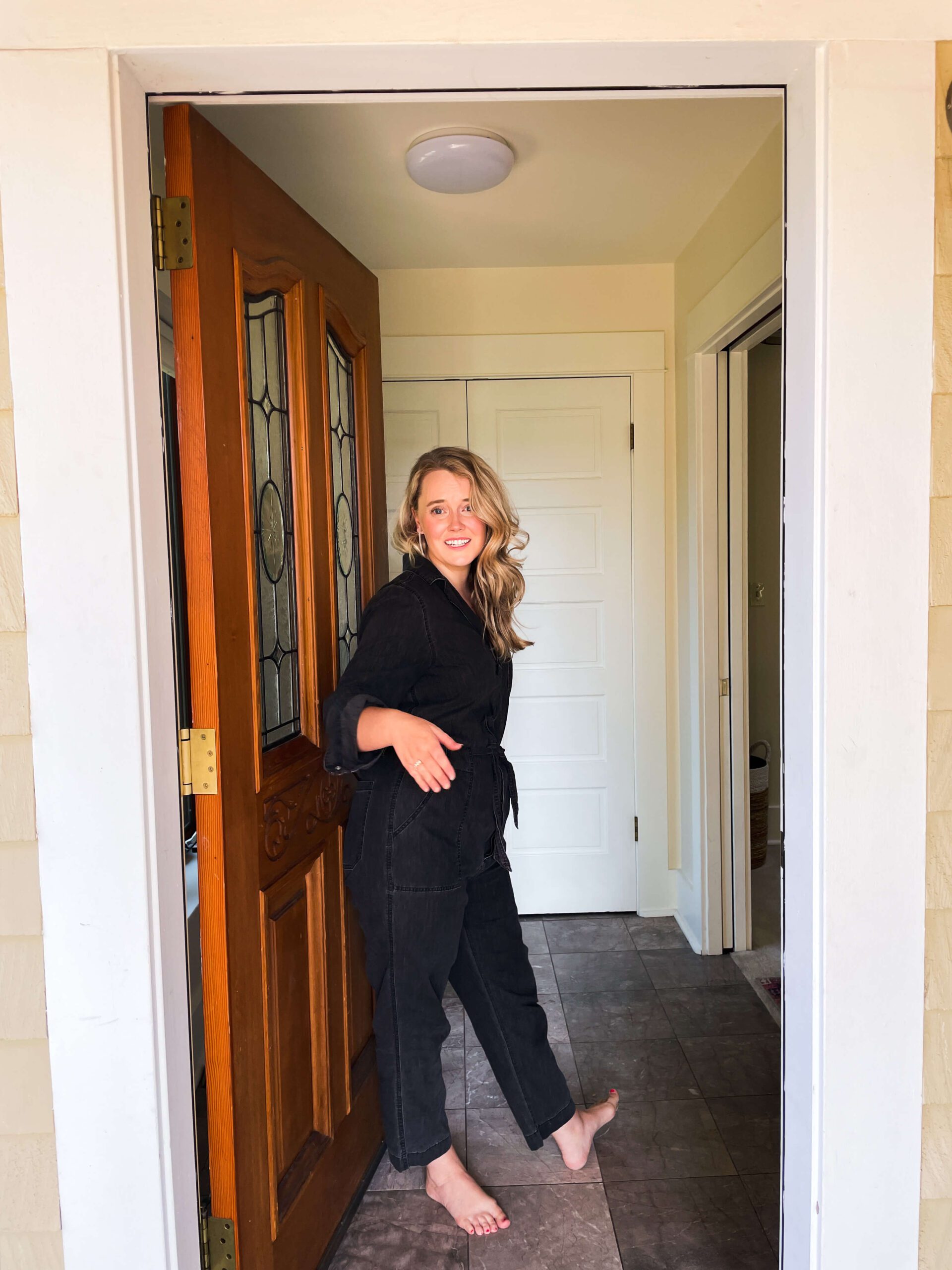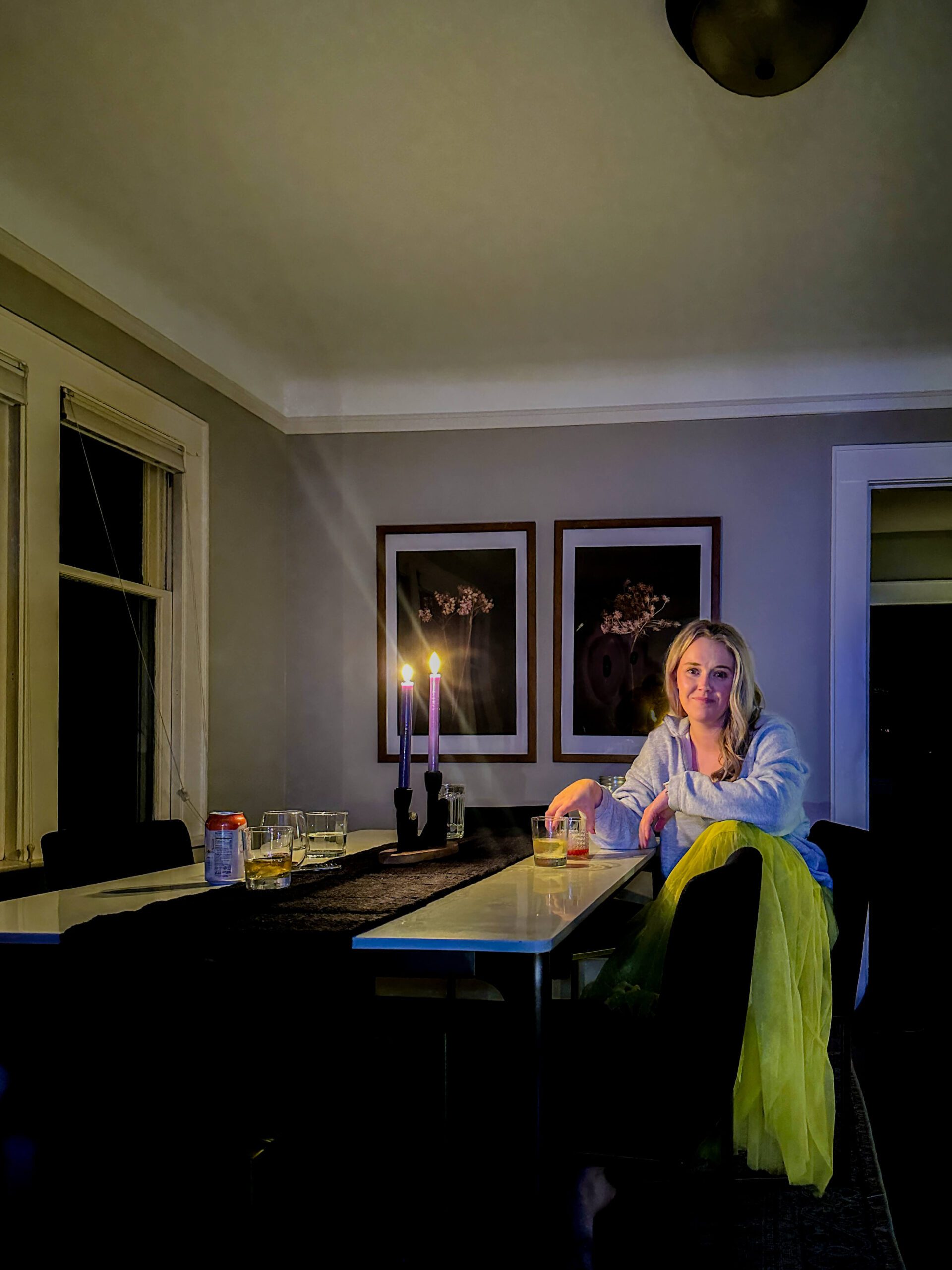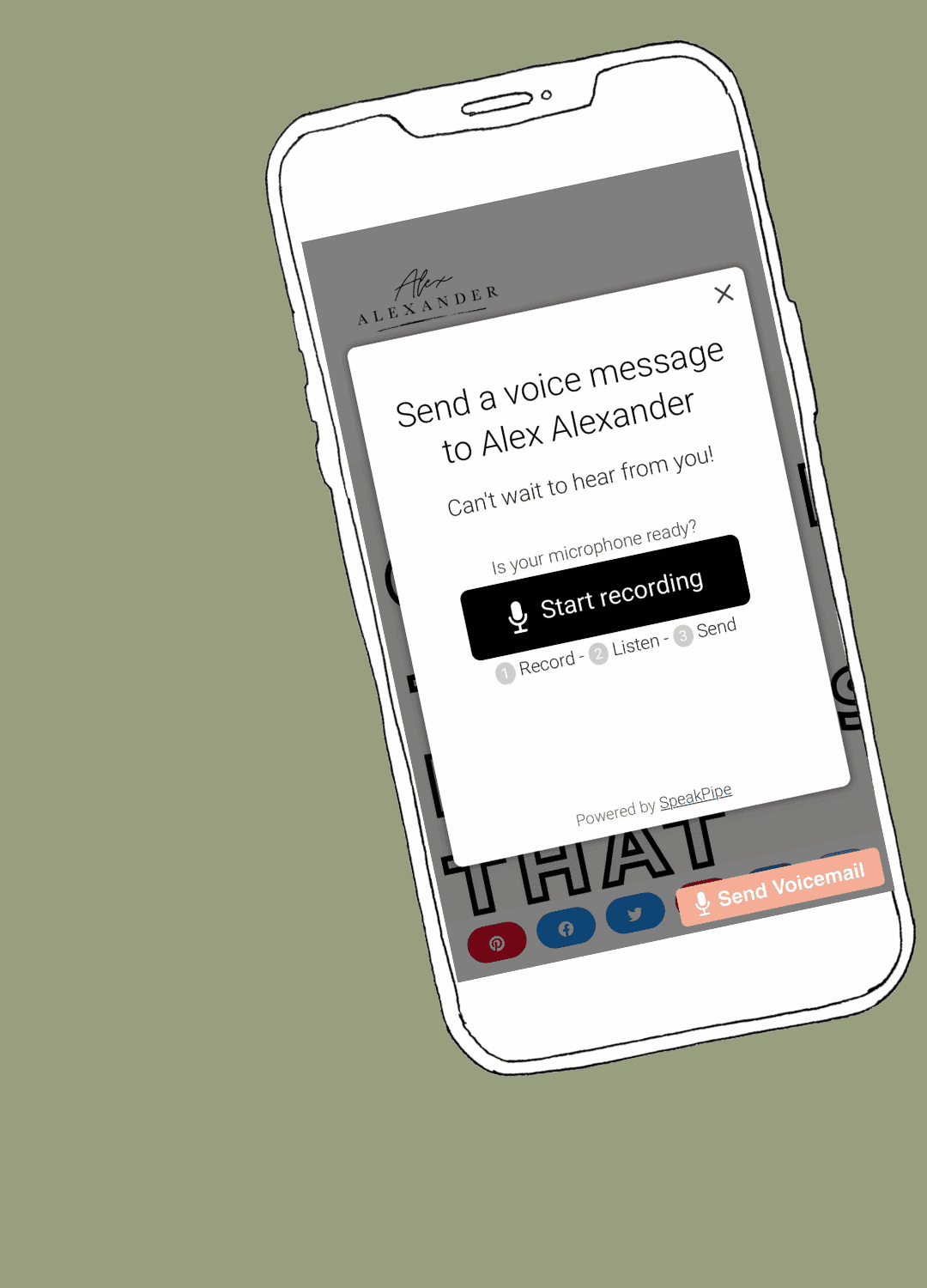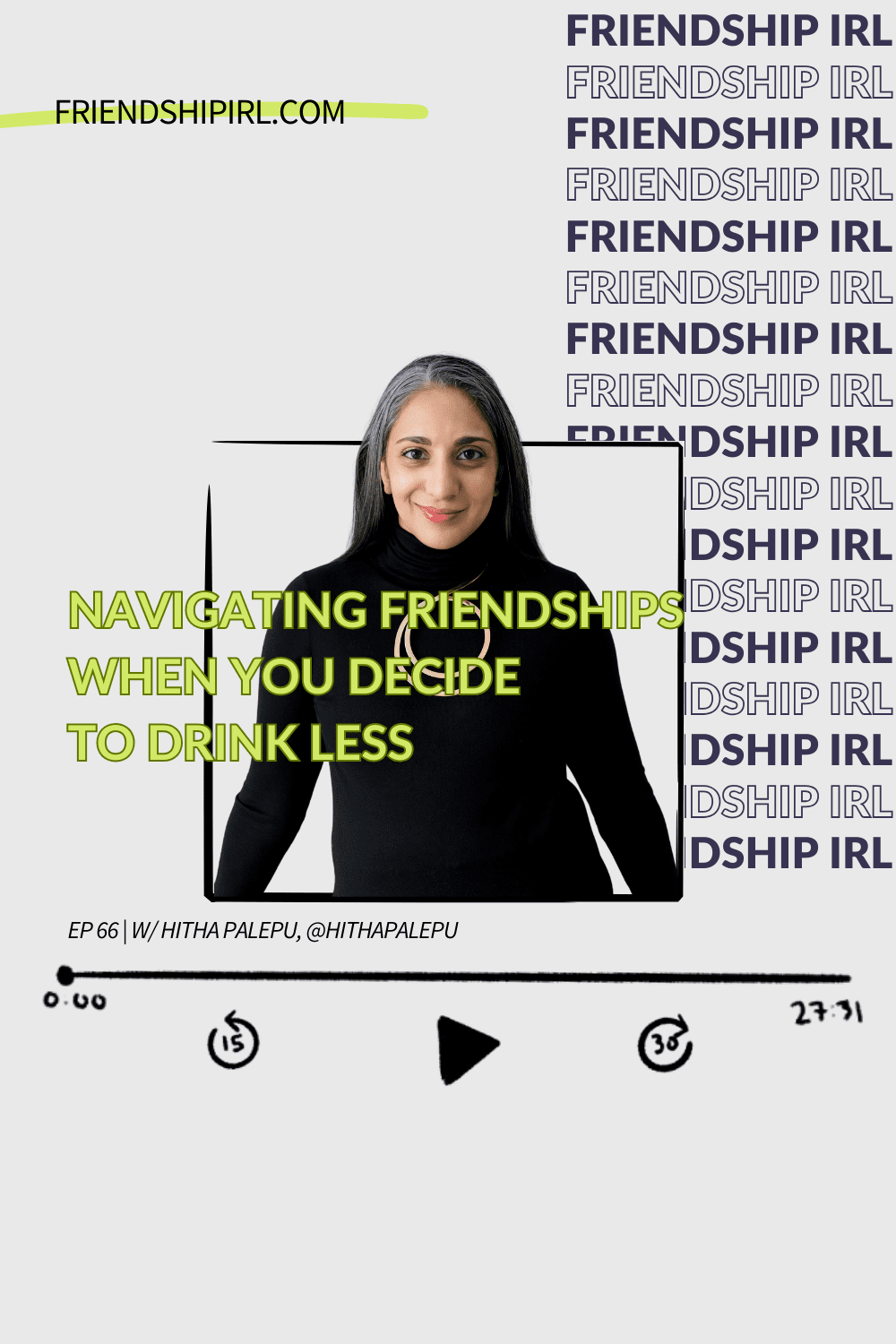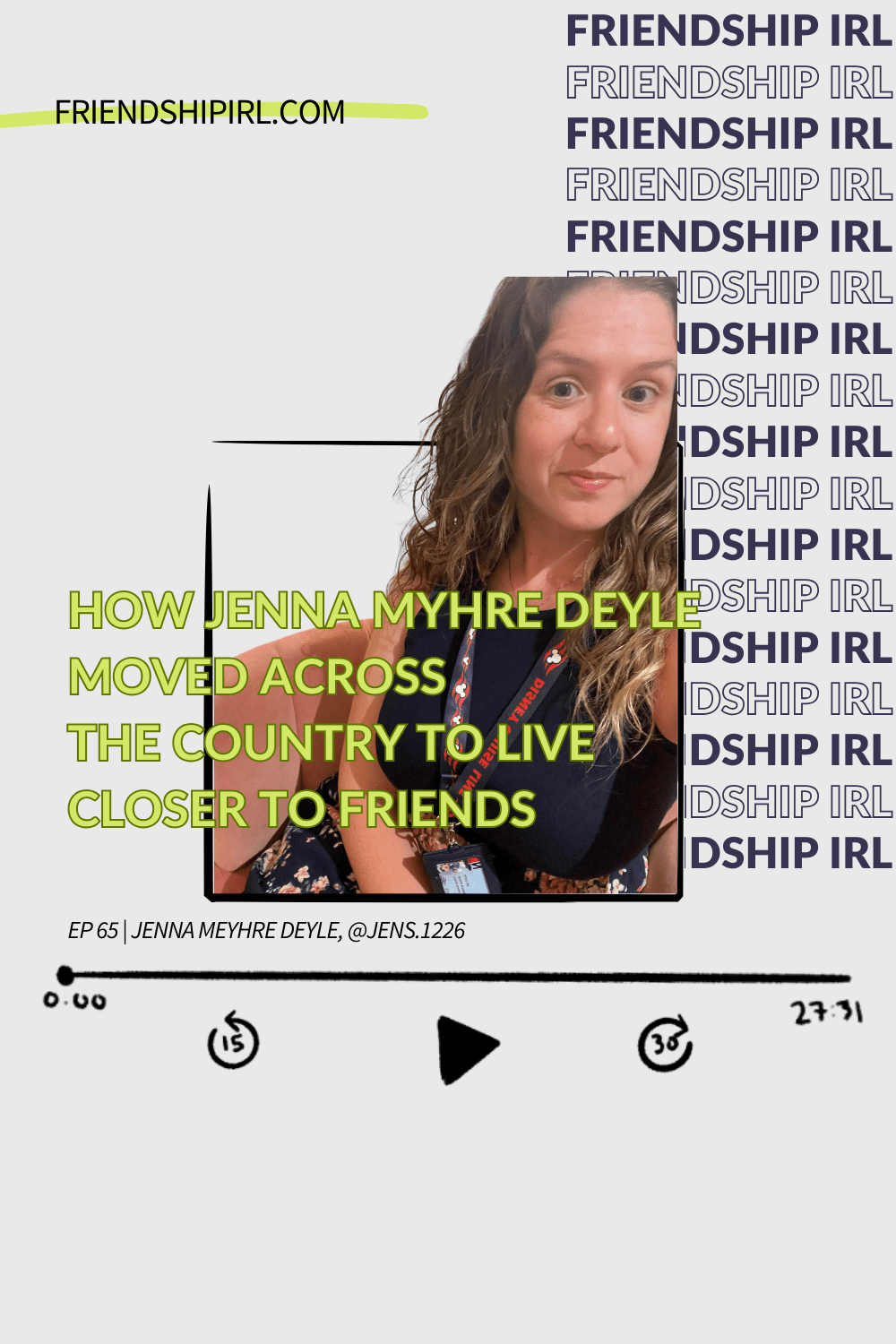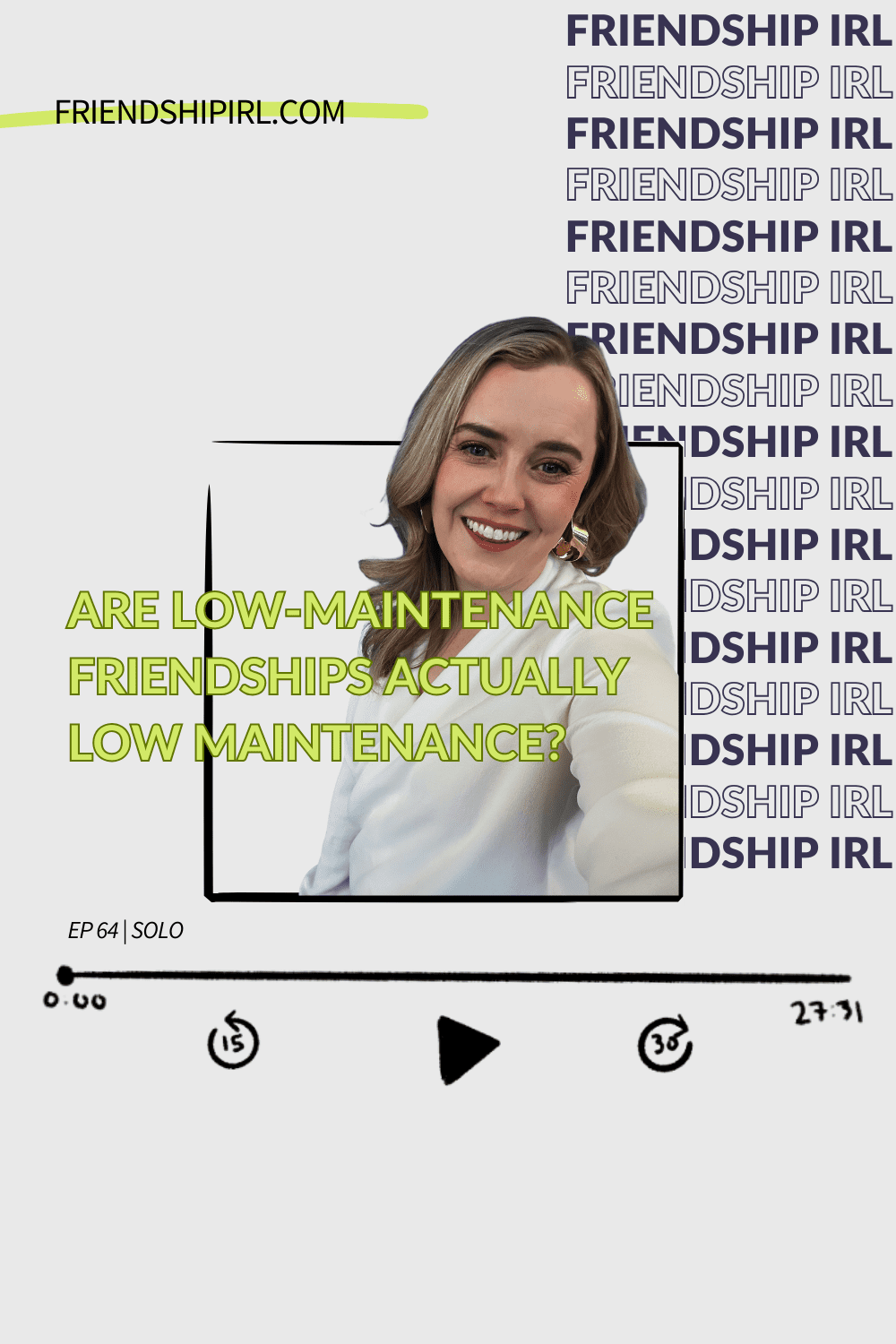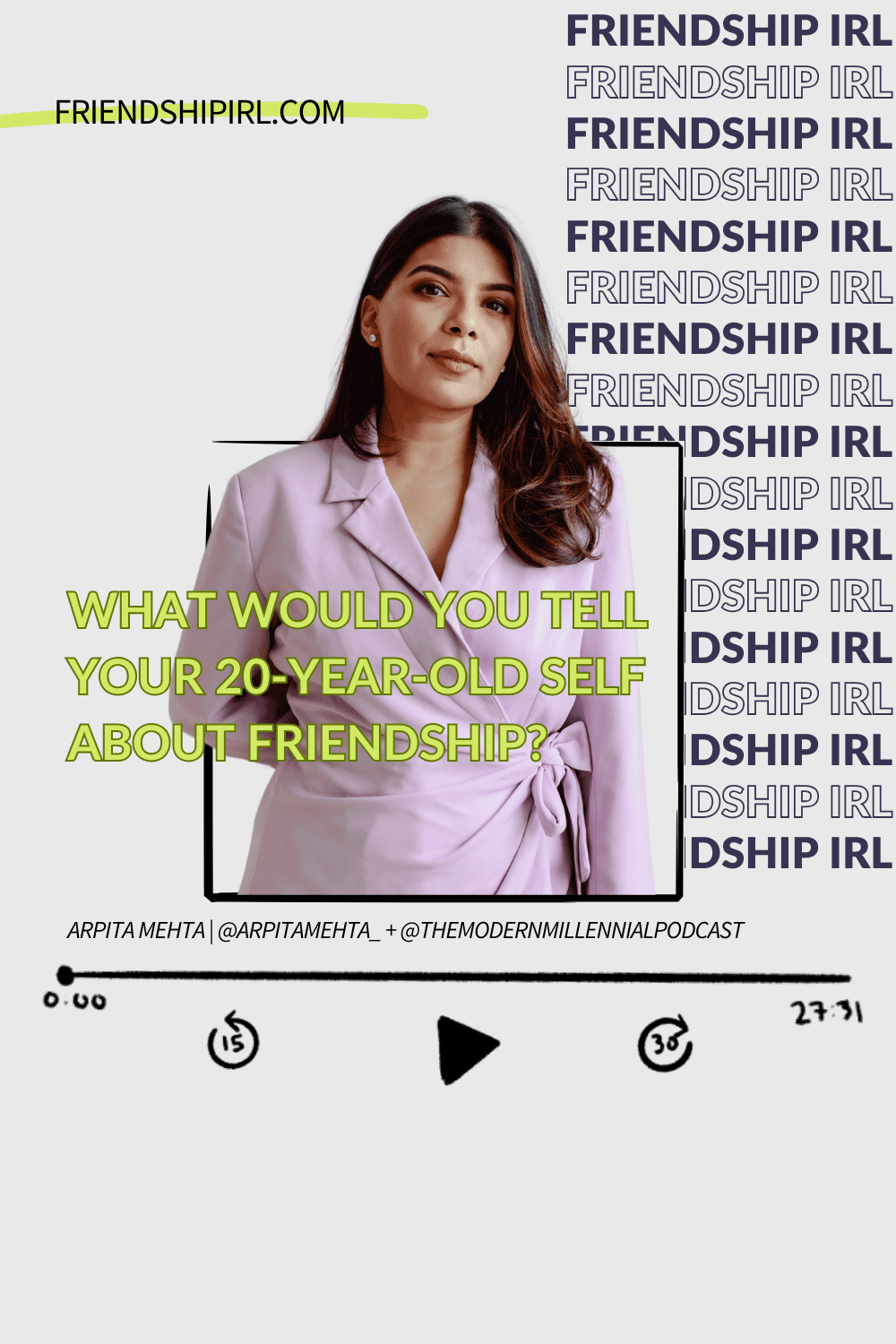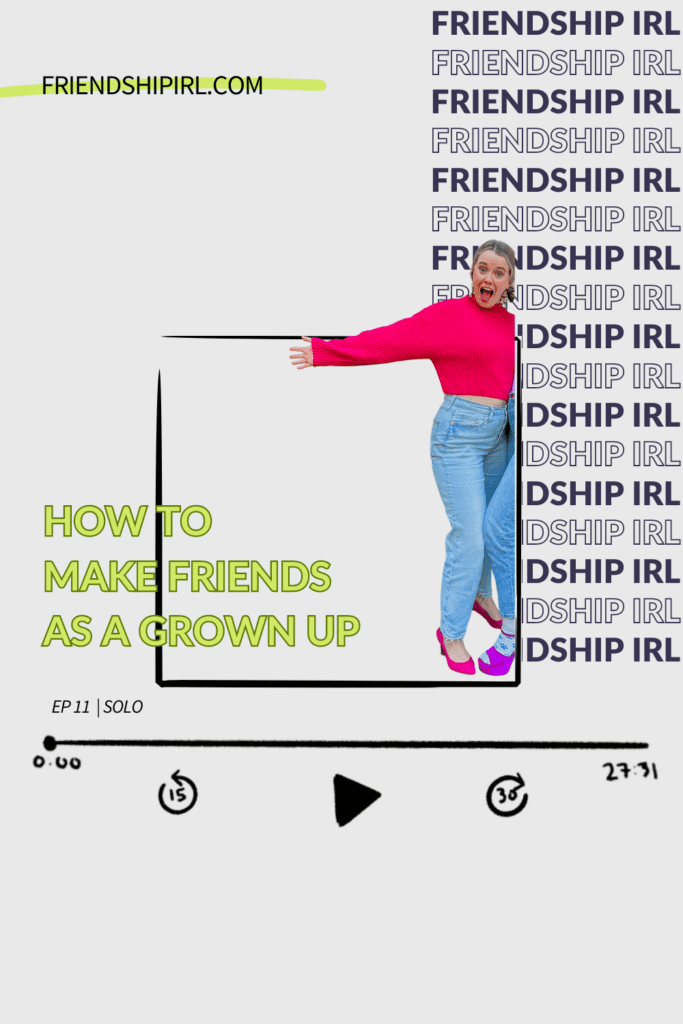
Podcast Description
A friend recently said to me, “The way you talk about making friends sounds kind of like dating.”
And, well, that’s because it kind of is.
There IS one major difference: romantic relationships hold so much pressure. We expect our partners to be our best friends, to offer romantic intimacy, to partake in finances, to be a joint manager of a household, and to potentially be a co-parent. They’re supposed to think of us, romance us, and surprise us.
But it doesn’t need to be that way in friendships. There’s value in even our simplest connections, so let’s get rid of that pressure and just enjoy meeting new people, trying new things, and connecting in new ways.
Today’s episode is about how to make friends – namely, the REALITY we find ourselves in when seeking friendship as grown-ups. How we do it now is going to be different from how we did it as children, teenagers, and young adults – but in a GOOD way.
In this episode you’ll hear about:
- The amount of pressure we put on romantic partners vs. friendships – and why, when making friends in real life, it’s better to expect less
- How friendship in media (movies, social media, books, TV) is curated to create drama or dream situations – this is often not real life!
- The realities behind the “pick-up-where-we-left-off friends” and the “friends that will always be there for us”
- How making friends and maintaining friendships requires staying curious, taking small risks, paying attention, showing up, and using our time, energy, and resources
- Spending time thinking about the kinds of new friends you want to make – i.e., what do you want to do with your friends? What do you want to connect over?
- How to get unstuck with “defined friends” by letting them into other parts of our lives and creating new shared experience routes
Reflection Question:
In the new year, what kinds of friendships are you looking to create and build? What do you want to do with your new friends, and how do you want to connect with them?
Notable Quotes from Alex:
“TV, movies, and books are created to sell. To hold our attention. To get good ratings. There’s supposed to be drama because that keeps us hooked. There’s supposed to be some dream situation, because we want to get lost in it – of what it could be. But instead of seeing it as curated and crafted to hold our attention, I think a lot of people look at TV, movies, and books, and think, well, this is what it should be.”
“Letting people in and finding new ways to do things together requires taking a risk, being vulnerable, and letting them in. You can do it in small ways. You don’t need to just jump in all at once. But making new friends – it’s not exciting. I mean, it is, in these small things – they are great and fun and beautiful. But it’s just doing these little actions repetitively and slowly. Connecting with someone – it takes time.”
Resources & Links
Like what you hear? Visit my website, leave me a voicemail, and follow me on Instagram!
Want to take this conversation a step further? Send this episode to a friend. Tell them you found it interesting and use what we just talked about as a conversation starter the next time you and your friend hang out!
Leave Alex a voicemail!
How to Make Friends as a Grown Up
@itsalexalexander Let’s talk about “How to Join a Friend Group.” #friendgroupproblems #friendgroups #friendshipadvice ♬ original sound – Alex | Community + Friendship
@itsalexalexander @itsalexalexander Check out the “Types of Friends” video linked here. #typesoffriends #typesoffriendship ♬ original sound – Layde_Shy
Can I add you to the group chat?
Don't miss an update - Sign up for our weekly newsletter.
Until next time…
Take the conversation beyond the new podcast on friendship! Follow Alex on Instagram (@itsalexalexander) or Tiktok (@itsalexalexander), or send her a voice message directly with all your friendship thoughts, problems, and triumphs by heading to AlexAlex.chat and hitting record.
Episode Transcript
Podcast Intro 00:00
All right, gang. Here’s to nights that turn into mornings and friends that turn in family. Cheers.
Podcast Intro 00:18
Hello, hello, and welcome to the Friendship IRL podcast. I’m your host, Alex Alexander. My friends, they would tell you I like to ask the hard questions. You know who I am in the group? I’m the person that’s saying, “Okay, I’m going to ask this question, but don’t feel like you have to answer it.” And now, I can be that friend for you too.
Alex Alexander 00:50
Every part of me doesn’t want to record this episode. Not because I don’t want to record an episode for you all. But because I don’t know why I am so against it. This just feels like a click baity episode. And I guess maybe it’s because recording an episode on how to make friends is that question that everybody asks. And there’s no quick, simple answer to. It’s like, when somebody asks, “How do you retire?” And a financial advisor just looks at you. “Well, which one of the 50 ways do you want to do it?” That’s how I feel about this episode. But I am going to try because I really do think this is what everybody wants. Here we go. Here we go. To start, let’s just talk about the pressures, the beliefs, the societal messages we hear about making new friends, especially as adults. Although I would think kids kind of feel this too, especially at a certain age, but friendship, interestingly enough, is just a very emotional pent up topic. I know this because when I tell people that I talk about community and friendship, they get kind of quiet, they want to wait to see what I have to say. And then when I, you know, acknowledge that this is not always easy, or this is something a lot of people want to talk about but our society doesn’t, then I can’t get people to stop talking. But that initial moment, there’s a lot of like, “Oh, what is she going to say? What is she going to say?” And that the more I’ve talked about friendship with my friends, they’ve opened up, they’ve said all sorts of things. But I had a friend say to me one time, “You know, the way you talk about making friends, sounds kind of like dating.” And it is. Now wait, don’t run, don’t run. It’s going to be okay, please don’t stop the episode here. I’m gonna look and see how many people stopped the episode here. The interesting thing, though, is that romantic relationships hold so much pressure. Like if you think about it, we expect romantic partners, whether this is right or wrong, we expect romantic partners to fill so many roles in our life. They’re supposed to be our best friend, romantic intimacy, they’re going to partake in finances, being a joint manager of a household, potentially a co-parent, they’re supposed to think of us and romance us and surprise us. There’s a lot of roles we are expecting a romantic partner. And it doesn’t need to be that way with community and friendship. I’ve talked about that so many times on here that although many of us grew up with this idea of, you know, we just need to find our best friend, we’re now breaking that belief down. We’re seeing that there’s value in even our simplest of connections. And we don’t need to put our pressure… that pressure on ourselves anymore. So although making new friends is kind of like dating, if we can get rid of that pressure, it can just be kind of fun to meet new people, try new things, have new conversations, connect in new ways. So yes, later in this episode, when I kind of give a breakdown, if you feel like this is kind of like dating just remember it doesn’t need to hold the same pressure. Before we dive in, we’re gonna keep breaking down some more beliefs we might have about making new friends. And I want to ask, where did you learn about friendship? A big dramatic pause. Where did you learn what a friend should do for you, how a friend should act? What friendship even means? Like we throw around this word like, “They’re my friend.” What does that mean to you? And where did that meaning come from? I think so much about… I mean, I think a lot of… a lot of the things I talked about on here, but it’s kind of wild to me. If you think about it, schools teach the most basic of social skills. You know, preschool, Elementary, I don’t even know if like older Elementary, they’re still teaching this. And we learn how to share, we learn how to say what we need, maybe we’re learning about how to set a boundary. But there’s really no classes taught on how to make friends. There are a handful of books. And believe me, I have deep dived into all the books. In fact, I’m looking at my bookshelf. If I was somebody that talks about romantic relationships, I would need like 10x the amount of space. Because there are so many more books on romantic relationships, parenting family relationships than there are about friendship. So maybe we learned something from books, but probably not very much. There’s articles and podcasts, I would say that both of these just now are starting to become more mainstream, like you see an article in whatever news outlet every so often, but this is not a… like a daily conversation most media is having. So I would say that we learned most of what we know about friendship via observation. We watch our parents, family friends, our friends’ parents, we watched our friends and their other friends. Now, some people, but not all, I have very much learned, because when I talk about where we learned about friendship, most people tell me that this was not a conversation their parents were having with them as kids. A lot of people also told me that their parents did not have great friendships. So, it wasn’t modeled. I’ve already talked about this in a previous episode. So, maybe parents were actually sitting down and having direct conversations about friendship. But I would say that’s not super common. And then there are like the anecdotes about what a friend should be. And those are kind of just passed around and simple little phrases. “Oh, friend should always be there for you.” You know, those… those social media posts or Pinterest quotes, that kind of stuff. So besides observation, the final place I think we’re learning about friendship is media. There’s obviously social media, which is actually being talked about quite a bit when it comes to friendships. You know, the whole social media is a highlight reel, we don’t actually know what’s going on behind the scenes, that although you might see some group of friends on a big trip, you don’t know what’s happening on that trip. We don’t know. Nobody knows. But the other one I think we’re not talking about enough is just like TV, and movies, and books. And the more I think about learning about friendship there, the more interesting I think it is, because those are created. TV, movies, and books are created to sell, like to hold our attention, to get good ratings. They’re supposed to be drama, because that keeps us hooked. There’s supposed to be some dream situation, because we want to get lost in it, of what it could be. But instead of seeing it as this curated, crafted to hold our attention, I think a lot of people look at the TV, movies, books, and think, well, this is what it should be. And sure, there might be some ideals in there. But their ideals shown to us in all areas of our life and we don’t necessarily expect that every area of our life is going to be the dream movie wealth. Because we’re all talking about the reality, and we’re not really talking about the reality of friendships as much. And when we learn these beliefs, that’s what we’re judging all of our friendships against. It’s like why? Why do we think that pick up where we left off friends are the best kind of friends?
PODCAST EPISODE! What is a friend? and the 4 Types of Friends we All Have. It’s one of our most popular episodes for a reason. Listen now.
Alex Alexander 10:05
Why do we think people need to like us immediately? We need to have that picture perfect movie romancing, see someone across the room and suddenly you’re best friends two days later? Why do we think friendship is so hard? And on the flip side, we think making friends is hard. That is an anecdote that people throw out right and left. But then why when we do have those friends do we think that friendship should be easy? Like once you’ve established the friendship, it should be easy. And if it’s not easy, put up a boundary, it’s not worth your time. We don’t hold that view about other relationships in our life. It is very commonly talked about that family is not always easy. There are endless conversations about how much work a romantic partnership takes. And for all the parents out there, we know parenting is not easy. And yet, there’s no anecdote out there that’s like, oh, well, parenting is hard. It’s not worth your time. Why does friendship have that? I don’t have an answer. But it’s like a question we should all be pondering. And why are very few people talking about friendships and community? Why are there so few podcasts and articles and books? Yet, these relationships are probably the most quantity we have in our lives. Most people, not all, have one romantic partner, a couple of kids, their family. And yet, people might have 10 friends or more, depending on your definition of friends, which hopefully is now more inclusive and consider some of those simple people. So we have so many and yet this is very rarely talked about. I could do a whole podcast episode on why I think that is and I probably will at some point. But for now, just like ponder these questions. Because we’re taking in all these beliefs about making friends, right? It’s so hard. But like, where did that come from? I mentioned before, that there’s certain types of friends out there that we kind of like put on a pedestal. So the magic of this pick up where we left off friend, now, I have these friends. I’m not saying this isn’t a good thing. I just wanted like, can we talk about the reality of this for a second? The holidays just happened. So many people maybe like traveled home. Like you saw friends you haven’t seen in a while potentially. You maybe saw one of these pickup where we left off friends. They are so beautiful in our lives. And quite often, not always, not always, but quite often what happens, right, is you see this pickup where you left off friends and you go do something you used to do together when you were like in each other’s life regularly, when you were present friends. So if you always went to lunch at this one restaurant, you ordered the same things like you go, the nostalgia is so real, feel so good. And you maybe go and catch up. You chat about life, you maybe tell some old stories, you live in the nostalgia. There might even be moments where you’re telling a story, or your friend is telling a story. And you have this realization like wow, they’re a different person now. But you don’t really have to think too much about it. You don’t have to live it because you’re just there for maybe that like couple hours to have lunch. The pick up where we left off friend is often kind of a vacation from our current reality. We’re gonna go do this thing that feels familiar with a person that we really care about. We’re going to tell old stories, we’re going to relive these things. And there’s literally nothing wrong with this except… well, not except, but I just want to think it through, right? There’s nothing wrong with this, but you leave and you might leave and be like, “Wow, that felt so nice. Now I have to go back to my real life.” We are not living in the moment with those people. And that’s okay. All of this is valuable. But I just think it’s funny because these pick up where we left off friends, like the reason we often love them is because at one point, we lived our life with them. We did things on the daily, connected with them, shared in the moment, experience things together. So now, we don’t and we appreciate the nostalgia and the memories. And we go on a vacation from our current reality. But there’s also beauty in like living in current reality with a new friend. It’s all equal, it’s all equal. So I don’t know why this pick up where we left off friend is just held so highly, because there’s value there, but there’s also value that’s not there anymore. Both exist. Another friendship that is often held in like such high regard are those friends that will always be there for us. That’s a story root by the way. They’ll always be there for me. These, again, are great friends, great friends. Somehow, when we say it, though, it’s like the permission that we can kind of just not pay so much attention to this friendship. And that might work. That might work. But what’s happening is, we’re really just leaning hard on that story roots, that they care for us. Like, we believe it. And in hard moments, we might call them, they’re the person that gets it. Now, if they answer and they say, “Yeah, I have time. I can totally listen to you right now”, They’ve done something that confirms our belief. They’ve given us what I call evidence. And this is great if that keeps happening that way. It also depends on the frequency. If you’re calling this person every month, and maybe one of these 12 times they say, “Oh, I just like really don’t have time today”, you have 11 other times where you’ve created evidence that supports your belief. But if you’ve gone the route of just, they’re the friend that will always be here for me and you’ve kind of leaned so hard on that, that you are not really reaching out, you’re not interacting, you’re not having those small moments together to create evidence and to connect, let’s say you call this brand once every two years, so it’s been a long time. And you’re just holding on to this friendship because you’re like, they’ll always be here for me, they’ll always be here for me. And then after these two years, you reach out. You call them. You’re like, “I’m just having such a bad day. And I got in a big fight with my parents.” Maybe they knew your parents from a younger life, you know, when you were younger, and they were in your lifetime. And they say to you, “I just… I really can’t today, I want to. Like I want to be there for you, but I cannot today.” That opportunity for evidence that comes once every two years doesn’t happen. And maybe we can accept that, right, and be like, “Oh, they just are past capacity. They don’t have time right now”, whatever that is. But if you don’t call them again for two years, and then that happens again, now all evidence is pointing to, well, they aren’t always there for me.
PODCAST EPISODE! Navigating Big Life Changes with Friends. Listen here!
Alex Alexander 18:09
And the statement, the firm belief of they’re here for me, starts turning in to question. Like, are they here for me? So when we lean on this, my friend will always be there for me. And we just let really long periods of time pass, then if other parts of life get in the way, and don’t allow us to be there for each other, even though they might want to, we start to question things. This is why I talk so much about the small actions. Because if you were able to have small connection points, actions, things like that kind of like built in between, you can be creating that evidence. So, you do have things that have happened that… that make you believe that you’re still connected to this friend. Now, I know I talked about this whole episode about how to make new friends. And then I moved over here to kind of like talking about the realities. And the reason I’ve done that is because my explanation of how to make friends is not super exciting. You know, it’s very pragmatic, probably, we have this built up idea of that marker of this person is my friend. And when we get there, something’s gonna be different, something’s going to be great. But in reality, those people we firmly believe are our friends, the reason we love them is because of the journey we’ve been on together. We’ve made making this new friend that apparently will always be there for us, or is that pick up where we left off friend or meet some example of the movies, when we get there, things are going to be different or better. But in reality, when we get there, we just love this person. Because we’ve done things together. We’ve lived life, we’ve made memories. We’ve had fun. We’ve navigated the ups and downs. And all that, we store away. And that’s what makes us love the person. So just like anything else, making friends is really about the journey. And if we can appreciate the journey, then the pressures to get to this marker of some big, all inclusive friendship, maybe won’t be so important. There’s no magic wand to making friends. Making friends and maintaining friendships, is going to require us to stay curious, take small risks, to pay attention, to show up, use our time and our energy and our resources to invest in these relationships. You want to make new friends. How to make new friends? We have now reached this point, I’m gonna do it.
Alex Alexander 21:11
So if you say to me, “I want to make new friends.” It’s like, “Alex, this year, I want to make some new friends.” I want to make new friends is similar to saying to someone I want to retire with a lot of money. Like how much money do you need to live the life you want? Which of the 50 routes to make said money to retire? Are you intrigued to go down? Like, I want to make new friends is way too broad to actually go out there and make it happen. Couple of routes, you can just decide that you overall are now going to become like a more connected person. That you are going to put yourself out there more, you’re going to join more groups, accept more invites, you’re gonna let people in, you’re going to take small risks. Like you can just do this and pay attention as you go along to the people you find interesting, and continue to connect with them. And over time, repeatedly, just deciding this is the kind of person you’re going to be, you’re naturally going to meet like new people add people to your life in a variety of ways. That’s one option. The other option if you want to make new friends, and you’re like, that sounds like a lot and I’m not quite ready to do that, is to get more specific to actually sit down and spend time thinking about what kind of new friends? What do you want to do with your friends? What do you want to talk to them about? Do you want to travel with them? Do you want to check out new restaurants with them? Do you want to watch movies with them? Play tennis? Run? Do you want to talk about finance, politics? Do love books and you want to sit around and talk about books? Like what do you want to connect with these people over? How do you want to spend your time together? And the interesting thing is when you start doing this, it creates a natural cognitive bias. It’s like when you see, you know, you decide you’re gonna buy a certain kind of car and suddenly you see that car everywhere on the road. When you get more specific, it allows you to ask better questions when you meet new people. And somebody you might have never really connected with, you wanted to meet a new running friend. And when you start asking them, they say they run and then it’s like, “Oh, do you run in a group? Do you run by yourself? Would you ever be interested in running together?” Like you get more specific, you can find these kinds of people. The other thing about getting specific is you can put yourself in places where these people are. Now, the joy of being an adult making friends is that we have a lot more control. Say, we can take intentional action and the people we’re meeting. And to outline this, I want to kind of like step back for a second and talk about how did we make our first friends? Because it’s this built up thing of like making these friends. But we all made our closest friends because they were just a person. That was also somewhere we happen to be. Or they were a person that was a friend of a friend. Or they were a person in a community we were a part of. Somebody was somewhere. They were just another person in the crowd. So maybe they were the friend sat in front of us in algebra in high school. They were just the person in front of us. We didn’t even pay much attention to them. They just walked in and out of the room and on a certain day, we introduced ourselves. We offered to help each other with homework. Over time, we learned we both love soccer, we were going to try out for the soccer team. We hung out at soccer practice, we learned more about each other, that my friend likes the color blue and chocolate chip cookies. So we bring them chocolate chip cookies, maybe we meet their mom because their mom picks them up from soccer practice. We can invite her to their house for dinner. We go to the movies with them, we do our math homework with them, we travel for soccer. Like our friends were just someone we met, some were at one point. And then we lived life together with them, we did things with them. We learned more about them, we cared more about them. We acted in ways that made us believe they care about us too. Maybe we even told each other that. And now these people so dearly matter to us. But it was all just built on that journey. So as adults, we can put ourselves in places where those people might be. As kids, we just met people in school, whether they were people we were really interested in or not. Maybe you are more of a… an arts kid. And the school you went to didn’t have a great arts program. So, you didn’t really meet very many people that way. And then in college, you went off to an arts focus school and you met all these people that suddenly shared all your interests. Like, as adults, we can do that we can put ourselves in the places, with the people that share interests. That’s the joy of making friends as an adult. So if you get specific, you think about the kinds of people, you can start putting yourself in places where those people are. And you can get to know them. You can ask questions, you can find shared interests, you can experience life together. And you’re gonna enjoy that journey of all that beginning stuff. Now, to me, you’ve just made friends. But that is not really going to satisfy a question that I think people are asking, but we don’t have language for. And that is how do I make friends that are actually like a real part of my life? Like the friends we had in high school and college and people that were there, we can invite them over to sit on our couch, how do we make those friends? So you’re gonna go do what I just said, and you’re gonna meet people that you are interested in. Now, a lot of people get stuck in what I call ‘Defined friends’. So if you met a new friend at the gym, they get stuck as your gym friend. And you might share super deep with them, you might tell them all about your family, your career goals, your travel. I mean, heck, you might share like deep stuff with this person, but they’re your gym friend. And that’s because we haven’t actually started to let them into other parts of our life. And the way to do that is to start inviting people into other parts of our life. I call this creating new shared experience roots. So, this means talking to them. Realizing that maybe you both have kids of the same age and suggesting they come over for dinner with their kids. Finding out you both want to travel and suggesting you go on a trip together. The more ways we can start to let people in, the more they become like integrated in our life. That’s what happened with those close friends we had back in the day. Like if you think about it, the example I used before with the high school friend where you met in math class and you were on soccer team, you went to their house, you met their parents. Maybe you came over when their grandparents were there for dinner. You were there sometimes when they got in trouble. You both went off to college, came home and then met each other’s college friends. You went and visited them in college. We got let into all these parts of life. We did things together. You drove them to get their oil changed. You tried an improv class, and you went to class together. Like, we just did things naturally. And then we made all the memories and we learned so much about each other because nothing makes you learn so much about someone like going grocery shopping together and learning what kind of yogurt they do and don’t like. But as adults, we’re hesitant to do that kind of stuff. But imagine if you did. Imagine if you and an adult friend, maybe you’re pretty close with, like went grocery shopping together how much you might learn about them that you never would have known otherwise. Because you’re actually doing like the mundane life stuff together. Letting people in and finding new ways to do things together requires taking a risk, kind of being vulnerable, letting them in. You can do it in small ways. You don’t need to just jump in all at once. But making new friends, it’s not exciting. It’s really… I mean, it is. Like these small things are great and fun and beautiful. But it’s just doing these little actions repetitively and slowly connecting with someone, it takes time. Whatever narrative we have, that somebody just needs to instantly like us, is so flawed. Because think about the number of people who say… some of their best friends are like, “I didn’t like you at first.” And then over time, they got to know each other. There’s no way also that we could have collected all the things we love about our closest friends in like a month. We adore them and our memories, because we just did all these little things together and created a trail of evidence over a long period of time. And that’s just what you’re doing when you make a new friend. One little thing at a time. Last thing I want to say is about… I have talked a lot about like making a new friend from scratch. You can make a new friend, basically, from like a previous friendship. So those historic friends, those friends that are the pick up where you left off kind of friend, you could basically make a new present friend from that friend. You can invest energy into connecting more in your everyday life, finding new ways to spend time together. And although it’s not really like a, quote unquote “new friend”, a totally new person to your life, getting to know a new version of this friend might feel like an entirely new friendship, but it involves investing very similar energy of staying curious, learning new things, trying new things, finding ways to be connected. You can do this. You can reconnect in new ways. And you might find that somebody in your circle already a year from now feels like an entirely new friendship. That was the long answer. The short answer is, I don’t have a magic wand to give you when it comes to making new friends. I’m just over here asking questions, bringing up new potential ways you can see friendship. And we’re all in the journey, right? We’re just meeting new people.
PODCAST EPISODE! Listen to “Simple Ways for Improving Social Wellness” here.
Alex Alexander 32:51
Enjoying the small things they bring to their life, allowing small actions to add up. We don’t need one person to be all the things to us. That’s hard to find. In fact, I think that’s impossible to find. But we can do. What we can control, like what we can take power in, is looking to take all the people around us and cumulatively build what we need for our unique interests and support and life and goals and values. We can start to slowly find all these people and build that for ourselves. And we aren’t taught how to do this. We already covered that. But you’re teaching yourself now. You’re relearning this. So let me know how it goes. Truly, I love hearing your stories. And I hope that this episode has you looking at your relationships just a little bit differently this year and putting yourself out there in the messy journey, but enjoying it while you do.
Alex Alexander 34:01
Thank you for listening to this episode of Friendship IRL. I am so honored to have these conversations with you. But don’t let the chat die here. Send me a voice message. I created a special website just to chat with you. You can find it at alexalex.chat. You can also find me on Instagram. My handle, @itsalexalexander. Or go ahead and leave a review wherever you prefer to listen to podcasts. Now if you want to take this conversation a step further, send this episode to a friend. Tell them you found it interesting. And use what we just talked about as a conversation starter the next time you and your friend hang out. No need for a teary Goodbye. I’ll be back with a new episode next week.

